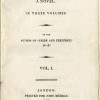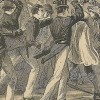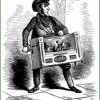
Rachel Ablow, “‘One Flesh,’ One Person, and the 1870 Married Women’s Property Act”
The 1870 Married Women’s Property Act marked a shift in the way marriage was regarded in England. Before that point, debates relating to divorce, married women’s property, and child custody revolved around different ideas of what constituted the good marriage: while many conservatives claimed that coverture (the legal doctrine that absorbed a married woman’s legal identity into her husband’s) guaranteed sympathetic communion between spouses, many progressives claimed that only legal equality could enable husbands and wives to enter fully into one another’s feelings. The 1870 Act marked a shift away from conservatives’ claims and towards those of progressives.

Anne D. Wallace, “On the Deceased Wife’s Sister Controversy, 1835-1907”
For more than 70 years the English engaged in heated public debate about whether a man should be able to marry his deceased wife’s sister. While twentieth-century scholars either ignored this controversy or attributed it to Victorian obsessions with psychological and/or cultural repressions of incest, the documents of the debate suggest that anxiety about the anomalous legal and economic autonomy of unmarried adult sisters drove the controversy. Recent interest in the Marriage with a Deceased Wife’s Sister (MDWS) debates seems fueled by increasing scholarly perceptions of “family” and its various relational terms, including “sister,” as historically and culturally embedded constructs that vary both within and across historical/cultural sites. Re-examined through this lens, the MDWS debates can be understood as negotiating competing ideals of “family” and “household” in which the adult unmarried sister either provided valuable material and/or affective support of the marriage or represented a disturbing intrusion of labor into the domestic space. For literary scholars, the MDWS debates signal the necessity of reading representations of family and, specifically, sibling relations without assuming the stability and/or uniformity of ideas and practices of “family” during the period.

Chris R. Vanden Bossche, “On Chartism”
The Chartists sought universal male suffrage because they regarded parliamentary legislation the principal means of enacting social reform. Precisely because they did not possess the right to vote, however, they had to employ alternative forms of action. This led to debates within the movement about whether they should seek to obtain the vote through persuasion—moral force—or though insurrection—physical force. The newspaper press representing the governing elites not only condemned the threat of physical force as unconstitutional, but also depicted moral force as essentially violent and therefore illegitimate. In response, the Chartist press produced a rhetoric representing physical force as a moral right in the face of an illegitimate governing elite. However, the effectiveness of this rhetoric depended on a strategy of indefinitely deferring the use of physical force, the shortcomings of which were manifested in the aftermath of the rejection of the Chartist petitions of 1839 and 1842.

Joshua Gooch, “On ‘Black Friday,’ 11 May 1866”
The panic of 11 May 1866, initiated by the collapse of Overend, Gurney, and Company, offers a useful vantage point to survey changes in British finance, economics, and politics, as well as the cultural perception of those changes. The panic exemplifies the expansion of London’s credit markets, the effects of the 1862 Companies Act, and the emergence of a clarified central bank policy. In addition, the panic crystallizes a shift toward statistical, impersonal, and biological descriptions in economic thought alongside the emergence of multi-perspectival character narration in texts like Robert Browning’s The Ring and the Book and Wilkie Collins’s The Moonstone.

Ayşe Çelikkol, “On the Repeal of the Corn Laws, 1846”
Parliament repealed the Corn Laws, the legislation that controlled the importation of grain, in 1846. Commercial and industrial interests had been advocating the repeal for decades, claiming that the Corn Laws benefited the landed aristocracy at the expense of the middle and working classes. Free traders called for an economic system under which the state would no longer protect landowners. Heated public debates on the Corn Laws, which addressed wages, taxes, and rents, often appealed to religious and moral values, exploring whether free trade was compatible with patriotism and traditional family structures. For the Victorians, national self-reliance and the cosmopolitan spirit of cooperation were both hanging in the balance as Parliament debated the preference for domestic grain.
